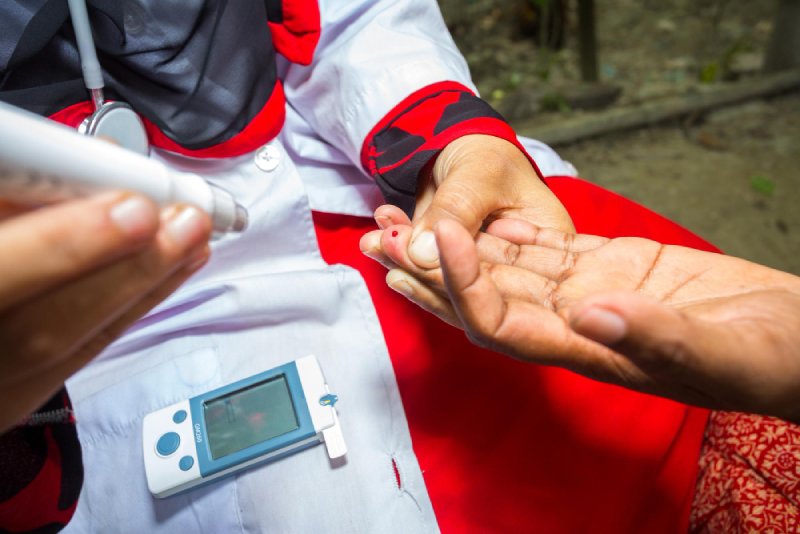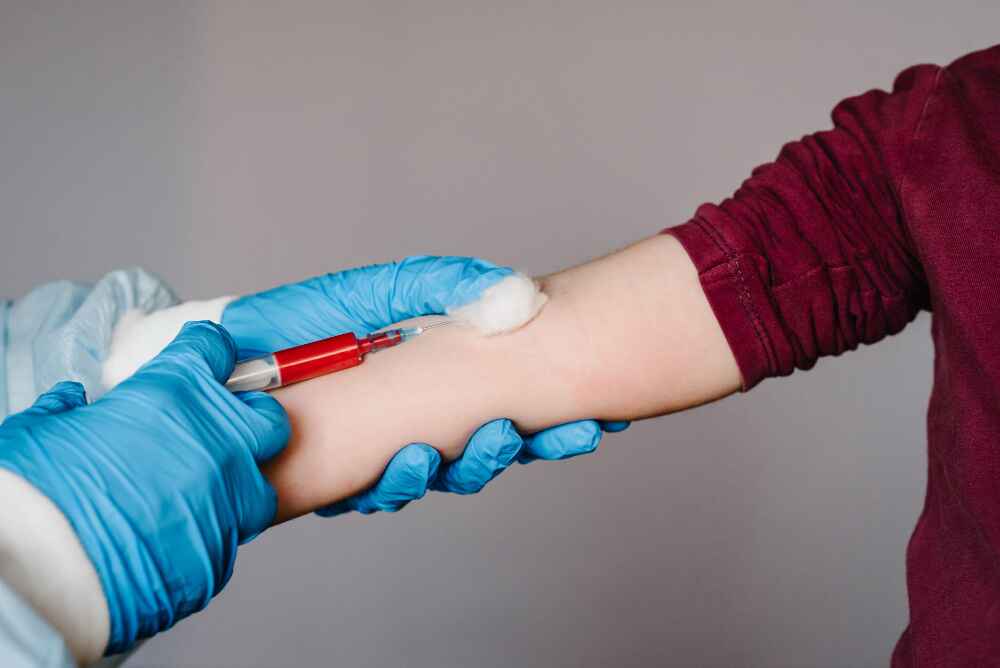Book on Whatsapp
9892101616
Why Blood Test at Home is the Future of Diagnostics
Blood Test
Tue Feb 18 2025
In recent years, healthcare has undergone a dramatic shift toward convenience and accessibility. One of the most significant advancements in this space is the ability to conduct blood tests from the comfort of one’s home. This emerging trend is reshaping diagnostics, offering numerous benefits that make it an essential part of the future of healthcare.
Convenience and Comfort
Traditional blood tests require a visit to a hospital or diagnostic center, often involving long waiting times, travel, and scheduling hassles. Home blood testing eliminates these inconveniences, allowing individuals to undergo tests at their preferred time without leaving their homes. This convenience is particularly beneficial for elderly patients, people with disabilities, and those with busy schedules.
Improved Accessibility
Many people, especially in rural and remote areas, struggle to access quality healthcare services. Home blood testing bridges this gap by enabling individuals to collect samples themselves or have a phlebotomist visit their location. This ensures that diagnostic services are available to a broader population, reducing disparities in healthcare accessibility.
Faster Results and Early Diagnosis
Time is crucial in diagnosing and treating various medical conditions. Traditional lab tests can take several days, whereas home testing services often provide quicker turnaround times. With rapid sample collection and digital result delivery, patients and doctors can identify health issues early and initiate timely treatment.
Enhanced Safety and Reduced Exposure to Infections
Visiting a hospital or clinic exposes individuals to various infections, especially during flu seasons or pandemics like COVID-19. Home blood testing minimizes this risk, making it a safer option for individuals with weakened immune systems, pregnant women, and senior citizens.
Encouraging Preventive Healthcare
Many individuals delay or avoid blood tests due to inconvenience or fear of needles. Home testing makes the process more comfortable and accessible, encouraging people to monitor their health regularly. This proactive approach can lead to early detection of diseases such as diabetes, cholesterol imbalances, and liver or kidney issues, ultimately promoting better long-
term health outcomes.
Technological Advancements Driving Growth
The rise of telemedicine and digital health platforms has significantly contributed to the adoption of home blood tests. Many services now offer user-friendly kits that require just a small finger-prick sample, eliminating the need for syringes and professional assistance. Advanced AI-driven platforms also provide detailed insights and trend analysis, helping individuals and healthcare professionals make informed decisions.
Cost-Effectiveness
Home blood tests can be more affordable than traditional lab tests, as they reduce overhead costs such as hospital infrastructure and administrative expenses. Many diagnostic companies offer subscription-based models, making routine health checkups more budget-friendly. Additionally, home testing minimizes indirect costs like travel expenses and lost work hours.
The Future of Home Blood Testing
As technology continues to evolve, we can expect even more sophisticated home testing options. Innovations such as wearable biosensors and real-time monitoring devices will further enhance diagnostics, making it possible to detect and manage health conditions instantly. With increased acceptance by healthcare providers and regulatory bodies, home blood testing is set to become a standard practice in preventive and diagnostic medicine.
Conclusion
Home blood testing represents a significant leap in the way medical diagnostics are conducted. By offering convenience, safety, accessibility, and efficiency, it is paving the way for a future where healthcare is more patient-centric. As adoption grows and technology advances, home diagnostics will play a crucial role in promoting a healthier, more proactive
society.
Related Tests
Related Packages
Related Blogs

Blood Test
Cholesterol Levels and What a Lipid Test Reveals
Cholesterol is a waxy, fat-like substance found in every cell of the human body. While it is essential for producing hormones, vitamin D, and substances that aid digestion, an excess of cholesterol in the bloodstream can pose serious health risks. Understanding your cholesterol levels through a lipid test is a crucial step in preventing heart disease, stroke, and other cardiovascular issues.
What Is Cholesterol?
Cholesterol is categorized into two main types: Low-Density Lipoprotein (LDL), often referred to as "bad" cholesterol, and High-Density Lipoprotein (HDL), known as "good" cholesterol. LDL carries cholesterol to your arteries, where it can build up and form plaques, narrowing the arteries and increasing the risk of heart attack and stroke. HDL, on the other hand, helps remove cholesterol from the bloodstream, transporting it back to the liver for excretion.
Another important component is Triglycerides, which are a type of fat found in your blood. When you eat more calories than your body needs, especially from sugar and fat, the excess is converted into triglycerides. High triglyceride levels, along with elevated LDL and low HDL, are linked to an increased risk of cardiovascular disease.
What Is a Lipid Test?
A lipid test, also known as a lipid profile or lipid panel, is a simple blood test that measures the levels of different fats in your blood. Typically, the test includes:
- Total Cholesterol: The overall amount of cholesterol in your blood.
- LDL Cholesterol: Often labelled as “bad” cholesterol because high levels can lead to plaque buildup.
- HDL Cholesterol: Known as “good” cholesterol as it helps remove LDL from the arteries.
- Triglycerides: Elevated levels can raise your risk of heart disease and may indicate metabolic syndrome or diabetes.
The test is usually performed after fasting for 9 to 12 hours, as food intake can temporarily influence lipid levels. Based on the results, your healthcare provider can assess your risk of cardiovascular disease and suggest lifestyle changes or medications if necessary.
Interpreting the Results
Normal lipid levels are typically defined as:
- Total Cholesterol: Less than 200 mg/dL
- LDL Cholesterol: Less than 100 mg/dL
- HDL Cholesterol: 60 mg/dL or higher (considered protective)
- Triglycerides: Less than 150 mg/dL
Borderline or high readings may signal the need for dietary adjustments, increased physical activity, weight management, or in some cases, medication like statins.
Importance of Regular Testing
Regular lipid testing is especially important for individuals over 40, those with a family history of heart disease, people with diabetes, obesity, or a sedentary lifestyle. Early detection of abnormal cholesterol levels can help you take proactive measures to protect your heart and overall health.
Monitoring cholesterol levels through a lipid profile test is a simple yet powerful tool in maintaining cardiovascular health. It offers valuable insights into your risk profile and can guide lifestyle modifications or medical interventions. By keeping cholesterol levels in check, you can significantly reduce your risk of heart disease and lead a healthier, longer life. Regular screening, a balanced diet, regular exercise, and stress management are key to keeping your heart strong and your cholesterol within a healthy range.
Take control of your heart health - test early, stay healthy.

Blood Test
Health Benefits of Blood Donation You Should Know
You may have seen health camps encouraging men and women of eligible ages to donate blood at least once a year. But have you ever wondered—is blood donation actually good for your health?
The answer is a resounding yes.
However, the primary motive of donating blood is to help someone in need, provide them a second chance at life. It is also surprisingly beneficial for the donor. From improving heart health to giving your body a gentle detox, regular blood donation is a simple act that offers powerful returns.
Benefits of blood donation
1. Natural cleanser: Donating blood acts as a natural body cleanser. It affects perfluoroalkyl levels and those of polyfluoroalkyl substances. It reduces skin-related disorders and encourages blood flow. It reduces acne and skin problems.
2. Improves cardiovascular health: Donating blood reduces the chances of cardiovascular issues and heart attacks. It reduces haemoglobin and iron amounts in the body, and blood pressure, and improves blood circulation.
3. Free health check-up: While donating blood at a health camp, you enjoy receiving free health checkups. Healthcare professionals understand your health vitals before the procedure. They test blood pressure and haemoglobin levels. You don’t have to pay for these checkups.
4. Promotes hair growth: After donation, the body produces new blood cells. It stimulates hair follicles while boosting new hair growth.
5. Screening infections and diseases: Health professionals screen your body to identify infectious diseases. It is a mandatory step. They test blood for a variety of diseases, including HIV, virus, malaria, etc.
6. Save lives: By donating blood, you get the opportunity to save precious lives. It includes cancer patients and those suffering from burns or traumatic injuries. You obtain their blessings.
What to do and avoid before and after blood donation?
- Have iron-rich food: Avoid fatty, unhealthy meals. They promote new blood cells.
- Pain relievers or blood thinners: Avoid them before donating blood.
- Get sufficient sleep: Take rest before donating blood. Be relaxed and avoid panic on blood donation day.
- Avoid drinking and smoking: Practice this at least two days before donating blood, as it could increase blood pressure. Moreover, it might reduce the amount in the blood.
- Avoid straining yourself: Performing rigorous exercises after donating blood should be avoided. Do not consume alcohol, smoke, or drugs for a day.
- Rest: After donating blood, A healthcare professional will supervise you. Do not lift heavy weights or perform strenuous physical activities for about hours.
Enjoy the selfless deed!

Blood Test
5 Routine Blood Tests That Help Detect Health Issues Early
Monitoring your health routinely with blood tests is one of the simplest ways to identify an issue before it becomes serious. Blood tests are helpful in providing valuable information about your body's function and can reveal areas of concern. If you're habitual in your routine check-ups, you can effectively make decisions that will benefit your health down the road.
Here are five blood tests worth noting that can help highlight health issues early on.
1. Complete Blood Count (CBC)
A Complete Blood Count, or CBC, is a standard test that looks at several components of your blood, such as red blood cells, white blood cells, and platelets. It can reveal infections, anemia, immune system disorders, and blood cancers.
Even if you feel fine, some health care providers suggest having a CBC once a year because it is part of a regular health screening. Diagnostic centers you trust, like manipaltrutest.com, offer fast, accurate, and high quality CBC tests to help you to be proactive about your health risks.
2. Blood Sugar Test
Elevated blood glucose can lead to diabetes, which can eventually lead to heart, kidney, eye, and nerve damage if lost to detection. For example, a simple fasting blood sugar test or HbA1c test provides a picture of your blood sugar control through time.
Preventing long-term complications is possible if you are diagnosed early with a blood sugar test. It will allow you to make lifestyle changes or take treatment when necessary to lower your blood sugar. If you have a family history of diabetes, then it is even more important to have your blood sugars tested regularly.
3. Lipid Profile
A lipid profile measures the levels of cholesterol and triglycerides in your blood. High cholesterol is a major risk factor for heart disease and stroke. This test checks your total cholesterol, good (HDL) cholesterol, bad (LDL) cholesterol, and triglycerides.
With early detection, you can take action by adjusting your diet, exercising more, or taking prescribed medications. Health centers offer complete lipid profile tests with clear reports and expert guidance.
4. Liver Function Test (LFT)
The liver is an important organ needed for digesting food, storing energy, and removing toxins. A Liver Function Test (LFT) will check for enzymes and proteins that can indicate how well your liver is functioning. Abnormal test results can indicate infections such as hepatitis, liver damage from alcohol or other underlying medical conditions. A regular LFT is critical, as often liver problems do not manifest any symptoms in their early stages. Regardless of whether or not you feel any pain, having your liver function checked now and again gives you peace of mind and could save your life. For peace of mind, consider having this test done once a year.
5.Thyroid Function Test
The thyroid controls your metabolism, energy, among other functions in the body. A Thyroid Function Test examines hormone levels such as T3, T4, and TSH to determine if your thyroid is underactive (hypothyroidism) or overactive (hyperthyroidism). Symptoms such as exhaustion, mysterious weight gains or losses, or mood changes could indicate a thyroid issue. Testing your thyroid health sooner rather than later allows you the opportunity to address and prevent complications that hinder your health and wellness.
Testing services such as Manipal TRUtest gives you the peace of mind of knowing that an reputable provider will have your results into the system quickly and efficiently, so you can continue to monitor your health.
Routine blood tests represent more than measurement of numbers on a report, they give a clearer picture of what is happening inside your body. Identifying health problems at the early stages can empower you with choices for your treatment; putting you in control and giving you a better chance of a longer healthier life.
When you choose to make routine health screenings a regular feature of your health through initiatives such as manipaltrutest.com, you are taking a step towards your health and a better future with less worry.
